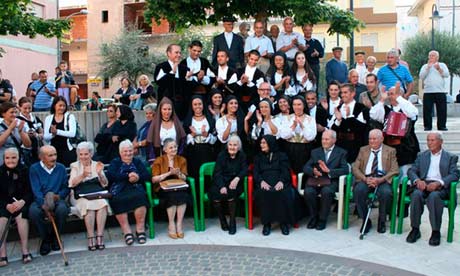
Doctors, dietitians and divines have long sought to identify the secret of a long life. The answer minestrone soup, according to nine siblings from Sardinia who were on Tuesday recognised as the world's oldest in terms of combined age.
The oldest member of the Melis family, Consolata, will be 105 on Wednesday, while the youngest of her siblings, Mafalda, nicknamed "the Little One" by her older sisters and brothers, is 78.
"To have such a large number of living siblings with an average age of more than 90 years is incredibly rare," the Guinness World Records editor in chief, Craig Glenday, said of the Melises who hail from Perdesdefogu in the mountainous Ogliastra province.
"We believe Ogliastra likely contains the highest number of centenarians per capita in the world," he added.
Scientists have to tried to work out what makes Sardinians live so long – 371 are over 100, or 22 for every 100,000 – and credit genetic heritage, frugal Mediterranean diet and a hardy lifestyle.
"We eat genuine food, meaning lots of minestrone and little meat and we are always working," said Alfonso Melis, 89, who narrowly escaped being captured by Nazi soldiers during the second world war and can be found today discussing bond spreads with customers in the cafe he runs.
"Every free moment I have I am down at my vineyard or at the allotment where I grow beans, aubergines, peppers and potatoes," he told the Guardian.
"You just keep working and you eat minestrone, beans and potatoes," added his older sister Claudia, 99, who attends church every morning.
Consolata, who has had 14 children – nine of whom are still alive – 24 grandchildren, 25 great grandchildren and three great, great grandchildren, still cooks and feeds her goats.
"My grandchildren have washing machines, dish washers and vacuum cleaners, and when I hear them say, 'I am stressed,' I don't understand," she told Corriere della Sera newspaper in her Sardinian dialect.
The world's oldest man living is Jiroemon Kimura, 114, from Japan. But Glenday said that seven out of the 70 people known to be older than 110 are Italian.
And Sardinia is the perfect environment to produce centenarians. "Local DNA is geared to long life and has not been diluted, while the cell proteins of Sardinians are also beneficial," Luca Deiana, a professor of biochemistry and molecular biology at the University of Sassari in Sardinia, told the Guardian.
"Sardinia is windy and that changes the air they breathe, there are no great extremes in temperature and the magnetic fields help. The prevalence of farming and shepherding means people are physically active."
Food was also key, argued Deiana. "A glass of red and a chunk of sheep's cheese or goat's ricotta is the standard meal for these 100-year-olds – all local, genuine food," he added.
Another key factor was esteem, said Deiana. "Older Sardinians live with their families and are respected as the living memories of their communities."
Claudia Melis's daughter Marta, who is 79 and lives with her mother, said: "We are a tight family – everyone should be like this."
The only downside to living in Perdasdefogu is that its sits on the edge of a large military weapons testing site, Salto di Quirra, which is being investigated for polluting grazing lands after cancer rates shot up among locals. But Adolfo Melis shrugged off such claims.
"My brother Antonio, who is 93, worked at the site for 25 years – you can see we are not a sick village."

